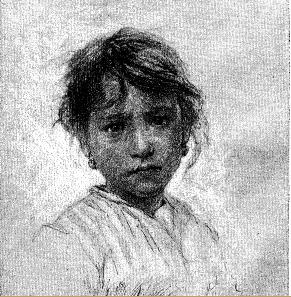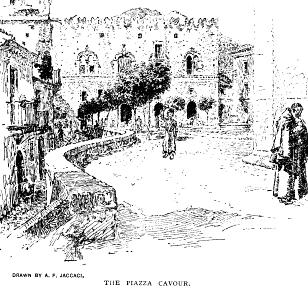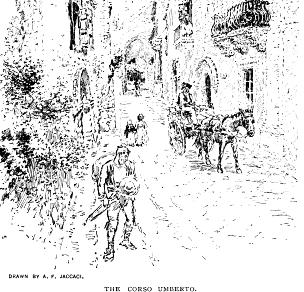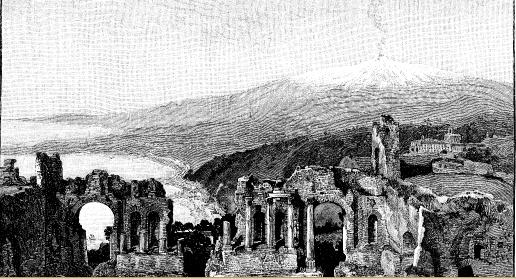
 'The
land of Theocritus' è uno scritto inedito del poeta scozzese William
Sharp che dimorò in Sicilia , dagli inizi del '900 sino alla morte,
a Maniace nel 1905. E' un testo lirico, in omaggio alla Sicilia; espressione
di quella letteratura europea che ricercava in Sicilia un pittoresco e
bucolico mondo perduto. A dominare in larga parte è l'Etna, gigante
reale e mitologico, chiamato dai contadini 'Madre Bianca', in grado di
esercitare fascino, suggestioni, paura e tanti altri e contrastanti sentimenti
e stati d'animo; impossibile sfuggirvi per gli antichi e moderni poeti
e narratori: per Pindaro era 'la colonna del cielo'; Mario Rapisardi scrive
'the very lemon boughs of Mascali, the orange branches of Aci, the roses
and lilies on the breasts of Catania, rejoice when Ætna is serene,
shrink and darken when the great Mother frowns'; una scena di una novella
di Verga racconta di un personaggio 'is about to confess to a score of
crimes, but suddenly, with radiant face, points to the white and terrible
splendour of Ætna, and sighing, "La Montagna," sinks back
and says no more'. Sono testimonianze di come l'Etna sia un 'magnete che
attrae tutto in Sicilia. 'L'Etna è il vero Polifemo, gigante con
un solo occhio, scrive William Sharp, attratto dalla sacralità
della montagna e dal passato mitico della Sicilia orientale tutta, dove,
tra Siracusa, Aci Castello, Naxos e Taormina
'The
land of Theocritus' è uno scritto inedito del poeta scozzese William
Sharp che dimorò in Sicilia , dagli inizi del '900 sino alla morte,
a Maniace nel 1905. E' un testo lirico, in omaggio alla Sicilia; espressione
di quella letteratura europea che ricercava in Sicilia un pittoresco e
bucolico mondo perduto. A dominare in larga parte è l'Etna, gigante
reale e mitologico, chiamato dai contadini 'Madre Bianca', in grado di
esercitare fascino, suggestioni, paura e tanti altri e contrastanti sentimenti
e stati d'animo; impossibile sfuggirvi per gli antichi e moderni poeti
e narratori: per Pindaro era 'la colonna del cielo'; Mario Rapisardi scrive
'the very lemon boughs of Mascali, the orange branches of Aci, the roses
and lilies on the breasts of Catania, rejoice when Ætna is serene,
shrink and darken when the great Mother frowns'; una scena di una novella
di Verga racconta di un personaggio 'is about to confess to a score of
crimes, but suddenly, with radiant face, points to the white and terrible
splendour of Ætna, and sighing, "La Montagna," sinks back
and says no more'. Sono testimonianze di come l'Etna sia un 'magnete che
attrae tutto in Sicilia. 'L'Etna è il vero Polifemo, gigante con
un solo occhio, scrive William Sharp, attratto dalla sacralità
della montagna e dal passato mitico della Sicilia orientale tutta, dove,
tra Siracusa, Aci Castello, Naxos e Taormina è possibile incontrare ancora luoghi e personaggi cantati da Teocrito
nei suoi Idilli: Tirsi dell'Etna, l'Anapo,le acque rese sacre di Aci,
Dafni e Danae che nel sesto idillio recitano l'amore del Ciclope per Galatea.
Ma ciò che sorprende Wlliam Sharp è la spravvivenza di donne
e uomini che sembrano ancora uguali a quelli dei versi di teocrito e che
si materializzano nelle forme e nei nomi arcaici di una ragazza, Pompilia,
che ha appena preso l'acqua dalla fonte e va con la sua anfora in testa,
del mulattiere Timoleonte e di Oreste, giovane barbiere di Taormina. E
proprio a Taormina a William Sharp appare - epifania della bellezza e
della forza ellenica la figura di un pescatore in una scena e un posto
'già visti' attraverso la poesia di Teocrito: 'One hot day at the
end of January the present writer and two friends rowed round the caverned
cliffs of Capo San Andrea, below Taormina, past the Grotto della Sirena,
or Cave of Ulysses, where a deep thunder revealed the force of the sea-swell,
which in vast azure and green depths surged rhythmically in and out; and
as we rounded Isola San Nicolo and came into the purple azure calm and
moored to the rocks close by the singular antique sea-wall which connects
San Nicolo and the headland of San Andrea (beneath which the Ionian Sea
surges with titanic force whenever the scirocco or the Mezzogiorno blows,
or when the ocean-swell predicts a coming storm "a sea" wall
about whose origin and even whose certain purpose no two authorities agree),
we saw first a solitary figure, perched in an apparently unscalable and
inescapable "coign of vantage," leaning with poised trident
intent to spear one of the great palamili (a kind of white salmon which
frequents the Ionian waters, and
è possibile incontrare ancora luoghi e personaggi cantati da Teocrito
nei suoi Idilli: Tirsi dell'Etna, l'Anapo,le acque rese sacre di Aci,
Dafni e Danae che nel sesto idillio recitano l'amore del Ciclope per Galatea.
Ma ciò che sorprende Wlliam Sharp è la spravvivenza di donne
e uomini che sembrano ancora uguali a quelli dei versi di teocrito e che
si materializzano nelle forme e nei nomi arcaici di una ragazza, Pompilia,
che ha appena preso l'acqua dalla fonte e va con la sua anfora in testa,
del mulattiere Timoleonte e di Oreste, giovane barbiere di Taormina. E
proprio a Taormina a William Sharp appare - epifania della bellezza e
della forza ellenica la figura di un pescatore in una scena e un posto
'già visti' attraverso la poesia di Teocrito: 'One hot day at the
end of January the present writer and two friends rowed round the caverned
cliffs of Capo San Andrea, below Taormina, past the Grotto della Sirena,
or Cave of Ulysses, where a deep thunder revealed the force of the sea-swell,
which in vast azure and green depths surged rhythmically in and out; and
as we rounded Isola San Nicolo and came into the purple azure calm and
moored to the rocks close by the singular antique sea-wall which connects
San Nicolo and the headland of San Andrea (beneath which the Ionian Sea
surges with titanic force whenever the scirocco or the Mezzogiorno blows,
or when the ocean-swell predicts a coming storm "a sea" wall
about whose origin and even whose certain purpose no two authorities agree),
we saw first a solitary figure, perched in an apparently unscalable and
inescapable "coign of vantage," leaning with poised trident
intent to spear one of the great palamili (a kind of white salmon which
frequents the Ionian waters, and  especially
near rocky coasts) swimming in the marvellously transparent depths just
underneath; and then, as we came into the azure stillness of the little
bay, behold, no other than Theocritus's old fisherman himself, or his
latter-day lineal descendant at least! Beyond, an ancient fisherman and
a rock are fashioned, a rugged rock, whereon with might and main the old
man drags a great net for his cast, as one, that labours stoutly. Thou
wouldst say that he is fishing with all the might of his limbs, so big
the sinews swell all about his neck, greyhaired though he be, but his
strength is as the strength of youth. Now divided but a little space from
the sea-worn old man is a vineyard laden well with fire-red clusters,
and on the rough wall a little lad watches the vineyard, sitting there.The
ancient fisherman, the rugged rock, the rock-set vineyard, a brown-legged
lad sitting singing on the broken wall a popular Sicilian ballad about
a villainous hero of the Mafia, one Musulino and the greyhaired old man
struggling "might and main " with the intricacies and dragging
weight of a huge net: every feature of the picture is repeated, as though
Theocritus had been a Tauromenian, and had viewed this very scene at this
very spot--the spot, it is said, where the Ionian Greeks who were the
pioneers of the Hellenic emigrants to Sicily first landed'. Quello di
William Sharp è un modo di vivere e descrivere
especially
near rocky coasts) swimming in the marvellously transparent depths just
underneath; and then, as we came into the azure stillness of the little
bay, behold, no other than Theocritus's old fisherman himself, or his
latter-day lineal descendant at least! Beyond, an ancient fisherman and
a rock are fashioned, a rugged rock, whereon with might and main the old
man drags a great net for his cast, as one, that labours stoutly. Thou
wouldst say that he is fishing with all the might of his limbs, so big
the sinews swell all about his neck, greyhaired though he be, but his
strength is as the strength of youth. Now divided but a little space from
the sea-worn old man is a vineyard laden well with fire-red clusters,
and on the rough wall a little lad watches the vineyard, sitting there.The
ancient fisherman, the rugged rock, the rock-set vineyard, a brown-legged
lad sitting singing on the broken wall a popular Sicilian ballad about
a villainous hero of the Mafia, one Musulino and the greyhaired old man
struggling "might and main " with the intricacies and dragging
weight of a huge net: every feature of the picture is repeated, as though
Theocritus had been a Tauromenian, and had viewed this very scene at this
very spot--the spot, it is said, where the Ionian Greeks who were the
pioneers of the Hellenic emigrants to Sicily first landed'. Quello di
William Sharp è un modo di vivere e descrivere l'isola da 'preraffaellita' quale è stato nella concezione dell'arte
e della vita che nella trasfigurazione idilliaca e nella ripresa di una
mitologia isolana e atemporale e di evanescente e ideale bellezza, certo
con momenti di riduzione folkloristica, che non perviene però alla
falsità arcadica delle foto di Whilem Von Gloeden, che negli stessi
anni frequentava e ritraeva i suoi famosi soggetti; con il lavoro del
quale, però, il testo di Sharp, come quelli di altri scrittori
stranieri, va confrontato.
l'isola da 'preraffaellita' quale è stato nella concezione dell'arte
e della vita che nella trasfigurazione idilliaca e nella ripresa di una
mitologia isolana e atemporale e di evanescente e ideale bellezza, certo
con momenti di riduzione folkloristica, che non perviene però alla
falsità arcadica delle foto di Whilem Von Gloeden, che negli stessi
anni frequentava e ritraeva i suoi famosi soggetti; con il lavoro del
quale, però, il testo di Sharp, come quelli di altri scrittori
stranieri, va confrontato.